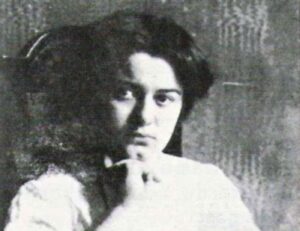On Tuesday, I discussed the dramatic trial near the end of Fyodor Dostoevsky’s novel The Brothers Karamazov. I pointed out how each side, both the prosecution and the defense, portrayed the trial as a struggle for the soul of Russia.
According to the prosecution, Dmitri Karamazov is Russia, and Russia is Dmitri Karamazov: a foolish libertine finally gone too far, a once-noble soul now corrupt and open to scorn, a passionate spirit that has degraded itself in undisciplined lusts. Dmitri Karamazov represents all that has gone wrong with a once-proud and once-great nation. The course is clear: convict Dmitri Karamazov and save Russia from its decadence and decline.
The defense, on the other hand, finds exactly the opposite lesson in the events narrated during the trial. It was the corruption of the father, not the reasonable response of the son, that should be credited with the crime. “Let us be brave, gentlemen of the jury,” he tells them,
let us even be bold: it is even our duty to be so in the present moment and not to be afraid of certain words and ideas . . . No, let us prove, on the contrary, that the progress of the past few years has touched our development as well, and let us say straight out: he who begets is not yet a father, a father is he who begets and proves worthy of it.
Start your day with Public Discourse
Sign up and get our daily essays sent straight to your inbox.
A father who has not proven himself worthy is, on this account, no father at all. In an appeal worthy in its sophistry of Apollo’s famous argument in the last part of Euripides’ Oresteia to the effect that the defendant Orestes should not be considered guilty of matricide given that, on the supposition of the theory of human generation from a “homunculus” (little man) within the male, his so-called “mother” Clytemnestra was not really a “blood relative” at all, our modern, enlightened defense attorney stands before the jury and pleads:
Let the son stand before his father and ask him reasonably: “Father, tell me, why should I love you? Father, prove to me that I should love you”—and if the father can, if he is able to answer and give him proof, then we have a real, normal family, established not just on mystical prejudice, but on reasonable, self-accountable, and strictly humane foundations.
And thus it is, by this sort of reasoning on “strictly humane foundations” that, according to our young enlightened defense attorney, the jurors should not only not deign to find young Dmitri guilty of parricide—indeed, given the shabby circumstances of his upbringing, perhaps he is not guilty of murder at all. “Let other nations have the letter and punishment,” he tells them, “we have the spirit and meaning, the salvation and regeneration of the lost. And if so, if such indeed are Russia and her courts, then—onward Russia!”
These are great speeches, and they must have moved Dostoevsky’s Russian readers in ways we can only imagine, given our detachment from the political and social currents of the time. Those with generally “conservative” views, unhappy with what they would have viewed as the decline of society and its standards, would undoubtedly have cheered the prosecutor’s criticism of the younger generation and cringed at the defense attorney’s diminution of the traditional meaning of the term “father” so as to suggest that parricide is not parricide if the man in question is not a worthy father.
Readers with more liberal progressive or “enlightened” views, by contrast, would probably have found the prosecutor’s case laughable, as they would have found the prosecutor himself contemptible in his antique ways of thinking. In him, they would have seen an old man of the previous generation who never made much of himself in the larger society, stuck in a government job in the small town in which he was raised, overmatched in the biggest trial of his life. Contrast him with the defense attorney Fetyukovich: dynamic, well-spoken, open-minded, a St. Petersburg luminary, educated at the best universities.
An Important Lesson about Trials
Yes, these are great speeches, both as courtroom drama and as a literary device on Dostoevsky’s part, manifesting the fundamental divide in the Russian society of his day. And yet, however great the speeches, they share one glaring fundamental flaw: they have next to nothing to do with the point of the trial, namely, determining whether Dmitri Karamazov did or did not kill his father. Russia may indeed have become a moral cesspool, and Karamazov may well be an irresponsible libertine, but neither claim establishes his guilt of this particular crime. Other parts of the novel reveal to us, in fact, that he is innocent of the crime, even though the physical evidence incriminating him is overwhelming. It is, as it turns out, that most notoriously untrustworthy sort of evidence that probably convicts him: eyewitness testimony. A loyal family servant says he is certain he remembers seeing a door open when in fact it was closed.
And yet, although Karamazov is innocent, and his defense attorney does much to counter the evidence against him, Fetyukovich’s closing comments are no more material to the facts of the case than those of the prosecutor. Perhaps Russia was moving into a bold, new era with bold, new ideas (“Onward Russia!”), but this too does not tell us if this particular man, Dmitri Karamazov, killed his father or not, irrespective of whether he was a “good” father or not.
Although Dostoevsky gives us the reactions of the trial’s spectators at various points, most of which are foolish and biased, intriguingly he tells us nothing about the reactions of the jury, except to provide this comment: “Yes, sir,” says one of the townspeople, “our peasants stood up for themselves.” “And finished off our Dmitri,” says another.
“Our peasants stand up for themselves” is in fact, the title of the chapter. But the title is ambiguous. Did they “stand with” Kirillovich because he represented the old order and noble Russia of years past? Or did they “stand against” the sophisticated, enlightenment-era courtroom savvy of the canny St. Petersburg attorney? Dostoevsky does not say. But the result is the same either way. In “standing up for themselves,” the peasants convict an innocent man of a crime he did not commit. They “finished off” Dmitri.
Although it’s not clear whether the jury accepted the defense attorney’s narrative about Russia or the prosecutor’s, it is clear that the dueling meta-narratives are what most enthralled the spectators of the trial. These are naturally very human reactions—as human as gazing at a car crash as one drives by. And yet, another lesson we can—and must—learn from Dostoyevsky’s wisdom, along with his warnings about the diminution of religion and the attendant corruptions of language and morals, is this: the sorts of considerations that enthrall the crowd are often entirely immaterial to the particular details of the trial of a particular man. Dmitri Karamazov’s guilt cannot be determined from the sorry state of the Russian nation any more than his innocence can be established from fact that decadent old Russians make bad fathers.
The General and the Particular
Laws, as Thomas Aquinas points out, are framed with an eye to the general case. Trials, on the other hand, are about the particular case at hand. Indeed, it is precisely the particularity of any specific case that makes it so unsuitable for formulating general principles. Those who make laws must “consider long beforehand what laws to make,” says Thomas, “whereas judgment on each single case has to be pronounced as soon as it arises: and it is easier for man to see what is right, by taking many instances into consideration, than by considering one solitary fact.” And again, lawgivers are called upon “to judge in the abstract of future events,” whereas judges and juries “sit in judgment of things present, towards which they are affected by love, hatred, or some kind of cupidity; wherefore their judgment is perverted.”
It is thus only with the greatest trepidation that I venture to make the slightest comment in retrospect about the trail that pitted the forces of Trayvon Martin against those of George Zimmerman. I wish to say nothing about the substance of the Zimmerman trial, either the evidence or the arguments used at trial, other than to remind us, in retrospect, of something we need to remind ourselves of before every “trial of the century” of the sort we get every three or four years in this country: Trials are not the place for working out our social grievances and anxieties.
The defendants in a trial represent no one but themselves. Indeed, they don’t even represent themselves; we ask attorneys to represent them in court.
In some other setting—say, in the hands of a great novelist—someone like Karamazov (either the bad father or the dissolute son) may represent “what’s wrong with Russia.” But in court, Dmitri Karamazov is simply himself—a man who has either killed his father or not. If he has, then he should be punished. If he has not, then there is no injustice in not punishing him.
We must seek the actual perpetrator of the crime. If we do not, then what happens in the courtroom becomes a legal mask for creating a scapegoat. In that case, the guilt of this particular man is immaterial as long as we as a society can pour out our guilt, our unclean feelings, our impure souls, upon him, and then cast him into the wilderness so that we may at long last be clean again.
The problem is, the Scottsboro Boys did not “stand for” the dangers that black men posed to white women in 1931 any more than Alfred Dreyfus “stood for” the dangers Jews posed to France in 1901. We don’t hang men like Adolf Eichmann because the Holocaust disgusts us; we hanged Eichmann because he committed crimes against humanity. We need to make sure the guilty are punished. But if the men we accuse did not commit the crimes for which they are accused, and we hang them anyway as a therapy for our collective guilt, then we will have become what we condemn: murderers of the innocent.
Is it too soon? Has enough time passed that we can reflect on the Zimmerman trial without the currents of emotion sweeping us away? Probably not. Which is why it’s probably best not to invest such trials with the sort of comprehensive significance we often do. Trials are an imperfect process. But I would rather trust that very rigorous “due process” to arrive at a clear understanding of the truth of the matter than trust that awesome responsibility to the ever-excitable denizens of the contemporary media circus.
Trials are not circuses or soap operas for our amusement and titillation. Nor should we view them as a sideshow to the great emotional debates of our age. Trials are disturbingly particular in their details, and for that reason often enough unusually dull to those who haven’t the patience for such matters. The health of a society is shown not when they’ve forced the court into what they’ve convinced themselves is the “right” outcome of a trial; it is, rather, when they’ve had the patience to allow “due process,” with all its faults and restrictions, to do the limited job it was designed to do.
Justice isn’t only something judges and juries do. It’s something we establish every day—in the way we live with others, in the way we speak humbly, in deference to reality and the truth of things, and above all in the way we honor our most fundamental obligations toward God and neighbor. That’s the road to real progress in society, if such a thing is to be had.












